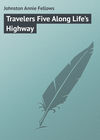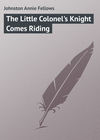Kitabı oku: «Georgina of the Rainbows», sayfa 4
CHAPTER VII
"THE TISHBITE"
COUSIN MEHITABLE was speaking to Mrs. Triplett, who seemed to be searching through bureau drawers for something. Georgina could tell what she was doing from the sounds which reached her. These drawers always stuck, and had to be jerked violently until the mirror rattled.
"Oh, don't bother about it, Maria. I just made an excuse of wanting to see it, because I knew you always kept it in here, and I wanted to get you off by yourself for a minute's talk with you alone. Since I've been in town I've heard so much about Justin and the way he is doing that I wanted to ask somebody who knew and who could tell me the straight of it. What's this about his leaving the service and going junketing off to the interior of China on some mission of his own? Jane tells me he got a year's leave of absence from the Navy just to study up some outlandish disease that attacks the sailors in foreign ports. She says why should he take a whole year out of the best part of his life to poke around the huts of dirty heathen to find out the kind of microbe that's eating 'em? He'd ought to think of Barbara and what's eating her heart out. I've taken a great fancy to that girl, and I'd like to give Justin a piece of my mind. It probably wouldn't do a bit of good though. He always was peculiar."
Georgina could hear only a few words of the answer because Tippy had her head in the closet now, reaching for the box on the top shelf. She stopped her search as soon as Cousin Mehitable said that, and the two of them went over to the fire and talked in low tones for a few minutes, leaning against the mantel. Georgina heard a word now and then. Several times it was her own name. Finally, in a louder tone Cousin Mehitable said:
"Well, I wanted to know, and I was sure you could tell me if anyone could."
They went back across the hall to the other guests. The instant they were gone Georgina crawled out from under the bed with the big bonnet cocked over one eye. Then she scudded down the hall and up the back stairs. She knew the company would be going soon, and she would be expected to bid them good-bye if she were there. She didn't want Cousin Mehitable to kiss her again. She didn't like her any more since she had called her father "peculiar."
She wandered aimlessly about for a few minutes, then pushed the door open into Mrs. Triplett's room. It was warm and cozy in there for a small fire still burned in the little drum stove. She opened the front damper to make it burn faster, and the light shone out in four long rays which made a flickering in the room. She sat down on the floor in front of it and began to wonder.
"What did Cousin Mehitable mean by something eating Barby's heart out?" Did people die of it? She had read of the Spartan youth who let the fox gnaw his vitals under his cloak and never showed, even by the twitching of a muscle, that he was in pain. Of course, she knew that no live thing was tearing at her mother's heart, but what if something that she couldn't understand was hurting her darling Barby night and day and she was bravely hiding it from the world like the Spartan youth?
Did all grown people have troubles? It had seemed such a happy world until to-day, and now all at once she had heard about Dan Darcy and Belle Triplett. Nearly everyone whom the guests talked about had borne some unhappiness, and even her own father was "peculiar." She wished she hadn't found out all these things. A great weight seemed to settle down upon her.
Thinking of Barbara in the light of what she had just learned she recalled that she often looked sorry and disappointed, especially after the postman had come and gone without leaving a letter. Only this morning Tippy had said – could it be she thought something was wrong and was trying to comfort her?
"Justin always was a poor hand for writing letters. Many a time I've heard the Judge scolding and stewing around because he hadn't heard from him when he was away at school. Letter writing came so easy to the Judge he couldn't understand why Justin shirked it so."
Then Georgina thought of Belle in the light of what she had just learned. Belle had carried her around in her arms when she was first brought to live in this old gray house by the sea. She had made a companion of her whenever she came to visit her Aunt Maria, and Georgina had admired her because she was so pretty and blonde and gentle, and enjoyed her because she was always so willing to do whatever Georgina wished. And now to think that instead of being the like-everybody-else kind of a young lady she seemed, she was like a heroine in a book who had lived through trouble which would "blight her whole life."
Sitting there on the floor with her knees drawn up and her chin resting on them, Georgina looked into the fire through the slits of the damper and thought and thought. Then she looked out through the little square window-panes across the wind-swept dunes. It did not seem like summer with the sky all overcast with clouds. It was more like the end of a day in the early autumn. Life seemed overcast, too.
Presently through a rift in the sky an early star stole out, and she made a wish on it. That was one of the things Belle had taught her. She started to wish that Barby might be happy. But before the whispered verse had entirely passed her lips she stopped to amend it, adding Uncle Darcy's name and Belle's. Then she stopped again, overcome by the knowledge of all the woe in the world, and gathering all the universe into her generous little heart she exclaimed earnestly:
"I wish everybody in the world could be happy."
Having made the wish, fervently, almost fiercely, in her intense desire to set things right, she scrambled to her feet. There was another thing that Belle had told her which she must do.
"If you open the Bible and it chances to be at a chapter beginning with the words, 'It came to pass,' the wish will come true without fail."
Taking Tippy's Bible from the stand beside the bed, she opened it at random, then carried it over to the stove in order to scan the pages by the firelight streaming through the damper. The book opened at First Kings, seventeenth chapter. She held it directly in the broad rays examining the pages anxiously. There was only that one chapter head on either page, and alas, its opening words were not "it came to pass." What she read with a sinking heart was:
"And Elijah the Tishbite."
Now Georgina hadn't the slightest idea what a Tishbite was, but it sounded as if it were something dreadful. Somehow it is a thousand times worse to be scared by a fear which is not understood than by one which is familiar. Suddenly she felt as bewildered and frightened as she had on that morning long ago, when Jeremy's teeth went flying into the fire. The happiness of her whole little world seemed to be going to pieces.
Throwing herself across the foot of Tippy's bed she crawled under the afghan thrown over it, even burrowing her head beneath it in order to shut out the dreadful things closing down on her. It had puzzled and frightened her to know that something was eating Barby's heart out, even in a figurative way, and now the word "Tishbite" filled her with a vague sense of helplessness and impending disaster.
Barbara, coming upstairs to hunt her after the guests were gone, found her sound asleep with the afghan still over her head. She folded it gently back from the flushed face, not intending to waken her, but Georgina's eyes opened and after a bewildered stare around the room she sat up, remembering. She had wakened to a world of trouble. Somehow it did not seem quite so bad with Barbara standing over her, smiling. When she went downstairs a little later, freshly washed and brushed, the Tishbite rolled out of her thoughts as a fog lifts when the sun shines.
But it came back at bedtime, when having said her prayers, she joined her voice with Barbara's in the hymn that had been her earliest lullaby. It was a custom never omitted. It always closed the day for her:
"Eternal Father, strong to save,
Whose arm doth bind the restless wave,
Oh, hear us when we cry to thee
For those in peril on the sea."
As they sang she stole an anxious glance at Barbara several times. Then she made up her mind that Cousin Mehitable was mistaken. If her father were "peculiar," Barby wouldn't have that sweet look on her face when she sang that prayer for him. If he were making her unhappy she wouldn't be singing it at all. She wouldn't care whether he was protected or not "from rock and tempest, fire and foe."
And yet, after Barby had gone downstairs and the sound of the piano came softly up from below – another bedtime custom, Georgina began thinking again about those whispering voices which she had heard as she sat under the bed, behind the bird-of-paradise valance. More than ever before the music suggested someone waiting for a ship which never came home, or fog bells on a lonely shore.
Nearly a week went by before Richard made his first visit to the old gray house at the end of town. He came with the Towncrier, carrying his bell, and keeping close to his side for the first few minutes. Then he found the place far more interesting than the bungalow. Georgina took him all over it, from the garret where she played on rainy days to the seat up in the willow, where standing in its highest crotch one could look clear across the Cape to the Atlantic. They made several plans for their treasure-quest while up in the willow. They could see a place off towards Wood End Lighthouse which looked like one of the pirate places Uncle Darcy had described in one of his tales.
Barby had lemonade and cake waiting for them when they came down, and when she talked to him it wasn't at all in the way the ladies did who came to see his Aunt Letty, as if they were talking merely to be gracious and kind to a strange little boy in whom they had no interest. Barby gave his ear a tweak and said with a smile that made him feel as if they had known each other always:
"Oh, the good times I've had with boys just your size. I always played with my brother Eddy's friends. Boys make such good chums. I've often thought how much Georgina misses that I had."
Presently Georgina took him out to the see-saw, where Captain Kidd persisted in riding on Richard's end of the plank.
"That's exactly the way my Uncle Eddy's terrier used to do back in Kentucky when I visited there one summer," she said, after the plank was adjusted so as to balance them properly. "Only he barked all the time he was riding. But he was fierce because Uncle Eddy fed him gunpowder."
"What did he do that for?"
"To keep him from being gun-shy. And Uncle Eddy ate some, too, one time when he was little, because the colored stable boy told him it would make him game."
"Did it?"
"I don't know whether that did or not. Something did though, for he's the gamest man I know."
Richard considered this a moment and then said:
"I wonder what it would do to Captain Kidd if I fed him some."
"Let's try it!" exclaimed Georgina, delighted with the suggestion. "There's some hanging up in the old powder-horn over the dining-room mantel. You have to give it to 'em in milk. Wait a minute."
Jumping from the see-saw after giving fair warning, she ran to one of the side windows.
"Barby," she called. "I'm going to give Captain Kidd some milk."
Barbara turned from her conversation with Uncle Darcy to say:
"Very well, if you can get it yourself. But be careful not to disturb the pans that haven't been skimmed. Tippy wouldn't like it."
"I know what to get it out of," called Georgina, "out of the blue pitcher."
Richard watched while she opened the refrigerator door and poured some milk into a saucer.
"Carry it in and put it on the kitchen table," she bade him, "while I get the powder."
When he followed her into the dining-room she was upon a chair, reaching for the old powder horn, which hung on a hook under the firearm that had done duty in the battle of Lexington. Richard wanted to get his hands on it, and was glad when she could not pull out the wooden plug which stopped the small end of the horn. She turned it over to him to open. He peered into it, then shook it.
"There isn't more than a spoonful left in it," he said.
"Well, gunpowder is so strong you don't need much. You know just a little will make a gun go off. It mightn't be safe to feed him much. Pour some out in your hand and drop it in the milk."
Richard slowly poured a small mound out into the hollow of his hand, and passed the horn back to her, then went to the kitchen whistling for Captain Kidd. Not all of the powder went into the milk, however. The last bit he swallowed himself, after looking at it long and thoughtfully.
At the same moment, Georgina, before putting back the plug, paused, looked all around, and poured out a few grains into her own hand. If the Tishbite was going to do anybody any harm, it would be well to be prepared. She had just hastily swallowed it and was hanging the horn back in place, when Richard returned.
"He lapped up the last drop as if he liked it," he reported. "Now we'll see what happens."
CHAPTER VIII
THE TELEGRAM THAT TOOK BARBY AWAY
THE painting of Richard's portrait interfered with the quest for buried treasure from day to day; but unbeknown either to artist or model, the dreams of that quest helped in the fashioning of the picture. In the preliminary sittings in the studio at home Richard's father found it necessary always to begin with some exhortation such as:
"Now, Dicky, this has got to be more than just a 'Study of a Boy's Head.' I want to show by the expression of your face that it is an illustration of that poem, 'A boy's will is the wind's will, and the thoughts of youth are long, long thoughts.' Chase that Binney Rogers and his gang out of your mind for a while, can't you, and think of something beside shinny and the hokey-pokey man."
So far the portrait was satisfactory in that it was a remarkably good likeness of an unusually good-looking boy, but it was of a boy who seemed to be alertly listening for such things as Binney's cat-call, signaling him from the alley. Here by the sea there was no need for such exhortations. No sooner was he seated before the easel in the loft which served as a studio, with its barn-like, double doors thrown open above the water, than the rapt expression which his father coveted, crept into his dark eyes. They grew big and dreamy, following the white sails across the harbor. He was planning the secret expedition he and Georgina intended to undertake, just as soon as the portrait was finished.
There were many preparations to make for it. They would have to secrete tools and provisions; and in a book from which Georgina read aloud whenever there was opportunity, were descriptions of various rites that it were well to perform. One was to sacrifice a black cock, and sprinkle its blood upon the spot before beginning to dig. Richard did not question why this should be done. The book recommended it as a practice which had been followed by some very famous treasure hunters. If at times a certain wide-awake and calculating gleam suddenly dispelled the dreaminess of expression in which his father was exulting, it was because a black Orpington rooster which daily strayed from a nearby cottage to the beach below the studio window, chose that moment to crow. Richard had marked that black cock for the sacrifice. It was lordly enough to bring success upon any enterprise.
In the meantime, as soon as his duties as model were over each morning, he was out of the studio with a whoop and up the beach as hard as he could run to the Huntingdon house. By the time he reached it he was no longer the artist's only son, hedged about with many limitations which belonged to that distinction. He was "Dare-devil Dick, the Dread Destroyer," and Georgina was "Gory George, the Menace of the Main."
Together they commanded a brigantine of their own. Passers-by saw only an old sailboat anchored at the deserted and rotting wharf up nearest the breakwater. But the passers-by who saw only that failed to see either Dare-devil Dick or Gory George. They saw, instead, two children whose fierce mustachios were the streakings of a burnt match, whose massive hoop ear-rings were the brass rings from a curtain pole, whose faithful following of the acts of Captain Quelch and other piratical gentlemen was only the mimicry of play.
But Barbara knew how real they were, from the spotted handkerchief tied around the "bunged eye" of Dare-devil Dick, under his evil-looking slouch hat, to the old horse pistol buckled to his belt. Gory George wore the same. And Barbara knew what serious business it was to them, even more serious than the affairs of eating and drinking.
Tippy scolded when she found that her half-pint bottles which she kept especially for cream had been smuggled away in the hold of the brigantine. But without bottles how could one give a realistic touch to the singing of "Yo ho, and the rum below"?
And Tippy thought it was heathenish for Barbara to let Georgina dress up in some little knickerbockers and a roundabout which had been stored away with other clothes worn by Justin as a small boy. But her disapproval was beyond words when Barbara herself appeared at the back door one morning, so cleverly disguised as a gypsy, that Mrs. Triplett grudgingly handed out some cold biscuits before she discovered the imposition. The poor she was glad to feed, but she had no use for an impudent, strolling gypsy.
"Don't be cross, Tippy," pleaded Barbara, laughing till the tears came. "I had to do it. I can't bear to feel that Georgina is growing away from me – that she is satisfied to leave me out of her games. Since she's so taken up with that little Richard Moreland I don't seem as necessary to her as I used to be. And I can't bear that, Tippy, when I've always been first in everything with her. She's so necessary to me."
Mrs. Triplett made no answer. She felt that she couldn't do justice to the occasion. She doubted if the Pilgrim monument itself could, even if it were to stretch itself up to its full height and deliver a lecture on the dignity of motherhood. She wondered what the Mayflower mothers would have thought if they could have met this modern one on the beach, with face stained brown, playacting that she was a beggar of a gypsy. How could she hope to be one of those written of in Proverbs – "Her children rise up and call her blessed. Her own works praise her in the gates."
Tippy ate her dinner alone that day, glancing grimly through the open window from time to time to the sand dunes back of the house, where an old hag of a gypsy in a short red dress with a gay bandanna knotted over her head, broiled bacon and boiled corn over a smoky campfire; and two swaggering villains who smelled of tar and codfish (because of the old net which half-way filled the brigantine), sucked the very cobs when the corn was eaten from them, forever registering that feast high above all other feasts in the tablet of blessed memories.
The interruption to all this came as unexpectedly as a clap of thunder from a clear sky. A messenger boy on a wheel whirled up to the front gate with a telegram. Tippy signed for it, not wanting the boy to see Barbara in such outlandish dress, then carried it out to the picnickers. She held it under her apron until she reached them. Telegrams always spelled trouble to Mrs. Triplett, but Barbara took this one from her with a smiling thank you, without rising from her seat on the sand. Her father often telegraphed instead of writing when away on his vacations, and she knew he was up at a lake resort in Michigan, at an Editors' Convention. Telegrams had always been pleasant things in her experience. But as she tore this open and read she turned pale even under her brown stain.
"It's papa," she gasped. "Hurt in an automobile accident. They don't say how bad – just hurt. And he wants me. I must take the first train."
She looked up at Mrs. Triplett helplessly, not even making an effort to rise from the sand, she was so dazed and distressed by the sudden summons. It was the first time she had ever had the shock of bad news. It was the first time she had ever been called upon to act for herself in such an emergency, and she felt perfectly numb, mind and body. Tippy's voice sounded a mile away when she said:
"You can catch the boat. It's an hour till the Dorothy Bradford starts back to Boston."
Still Barbara sat limp and powerless, as one sits in a nightmare.
Georgina gave a choking gasp as two awful words rose up in her throat and stuck there. "The Tishbite." Whatever that mysterious horror might be, plainly its evil workings had begun.
"Tut!" exclaimed Tippy, pulling Barbara to her feet. "Keep your head. You'll have to begin scrubbing that brown paint off your face if you expect to reach the boat on time."
Automatically Georgina responded to that "tut" as if it were the old challenge of the powder horn. No matter how she shivered she must show what brave stuff she was made of. Even with that awful foreboding clutching at her heart like an iron hand and Barby about to leave her, she mustn't show one sign of her distress.
It was well that Georgina had learned to move briskly in her long following after Tippy, else she could not have been of such service in this emergency. Her eyes were blurred with tears as she hurried up to the garret for suitcase and satchel, and down the hall to look up numbers in the telephone directory. But it was a comfort even in the midst of her distress to feel that she could take such an important part in the preparations, that Tippy trusted her to do the necessary telephoning, and to put up a lunch for Barby without dictating either the messages or the contents of the lunch-box.
When Mr. James Milford called up, immediately after Richard had raced home with the news, and offered to take Mrs. Huntingdon to the boat in his machine, he thought it was Mrs. Huntingdon herself who answered him. The trembling voice seemed only natural under the circumstances. He would have smiled could he have seen the pathetic little face uplifted towards the receiver, the quivering lip still adorned with the fierce mustachios of Gory George, in strange contrast to the soft curls hanging over her shoulders now that they were no longer hidden by a piratical hat. She had forgotten that she was in knickerbockers instead of skirts, and that the old horse-pistol was still at her belt, until Barbara caught her to her at parting with a laugh that turned into a sob, looking for a spot on her face clean enough to kiss.
It was all over so soon – the machine whirling up to the door and away again to stop at the bank an instant for the money which Georgina had telephoned to have waiting, and then on to the railroad wharf where the Dorothy Bradford had already sounded her first warning whistle. Georgina had no time to realize what was actually happening until it was over. She climbed up into the mammoth willow tree in the corner of the yard to watch for the steamboat. It would come into view in a few minutes as it ploughed majestically through the water towards the lighthouse.
Then desolation fell upon her. She had never realized until that moment how dear her mother was to her. Then the thought came to her, suppose it was Barby who had been hurt in an accident, and she Georgina, was hurrying to her as Barby was hurrying to grandfather Shirley, unknowing what awaited her at the journey's end. For a moment she forgot her own unhappiness at being left behind, in sympathetic understanding of her mother's distress. She wasn't going to think about her part of it she told herself, she was going to be so brave —
Then her glance fell on the "holiday tree."
The holiday tree was a little evergreen of Barby's christening if not of her planting. For every gala day in the year it bore strange fruit, no matter what the season. At Hallowe'en it was as gay with jack-o-lanterns and witches' caps as if the pixies themselves had decorated it. On Washington's birthday each branch was tipped with a flag and a cherry tart. On the fourteenth of February it was hung with valentines, and at Easter she was always sure of finding a candy rabbit or two perched among its branches and nests of colored eggs. It seemed to be at its best at Christmas, but it was when it took its turns at birthday celebrations that it was most wonderful. Then it blossomed with little glass lanterns of every color, glowing like red and green and golden stars. Last year it had borne a great toy ship with all sails set, and nine "surprise" oranges, round, yellow boxes, each containing a gift, because she was nine years old. In just two more days she would be ten, and Barby gone!
At that instant the boat whistle sounded long and deep, sending its melodious boom across the water. It seemed to strike some chord in the very center of her being, and make her feel as if something inside were sinking down and down and down. The sensation was sickening. It grew worse as the boat steamed away. She stood up on a limb to watch it. Smaller and smaller it seemed, leaving only a long plume of smoke in its wake as it disappeared around Long Point. Then even the smoke faded, and a forlorn little figure, strangely at variance with the fierce pirate suit, she crumpled up in the crotch of the willow, her face hidden in her elbow, and began to sob piteously: "Oh, Barby! Barby!"









